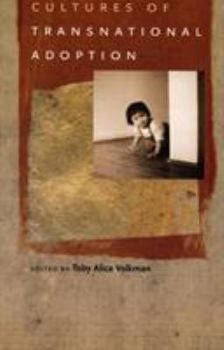Cultures of Transnational Adoption
Select Format
Select Condition 
Book Overview
During the 1990s, the number of children adopted from poorer countries to the more affluent West grew exponentially. Close to 140,000 transnational adoptions occurred in the United States alone. While in an earlier era, adoption across borders was assumed to be straightforward--a child traveled to a new country and stayed there--by the late twentieth century, adoptees were expected to acquaint themselves with the countries of their birth and explore...
Format:Paperback
Language:English
ISBN:0822335891
ISBN13:9780822335894
Release Date:June 2005
Publisher:Duke University Press
Length:248 Pages
Weight:0.70 lbs.
Dimensions:0.7" x 6.2" x 9.2"
Customer Reviews
2 ratings
Transnational Adoption: Beyond a Singular Lens?
Published by Thriftbooks.com User , 18 years ago
This edited collection by Toby Volkman has a fair few adoptive parents (who are academically working as anthropologists) playing the roles of interrogators, interpreters and story tellers of this global phenomenon. Sometimes the object of their analysis is their own community (adoptive parents) and sometimes it is Others (birth parents, the overseas children they adopt). This positioning itself is not unusual, for adoptive parents (who are also making a living as adoption researchers, practioners, authors and so on) dominate the publications coming out on the practice of transnational adoption. While their own voices remain valuable, the lack of voices from researchers who are adopted, from the birth countries and birth parents has limitd the lens through which the practice is viewed and understood. However, this edited collection remains a must have for any adoption researcher - as well as scholars interested in issues of transnationalism, diasporas and "new" or "hybrid" cultural identities. It is also accessible enough for ordinary readers, including adoptive parents begin to overcome many of the myths and fantasies surrounding the practice. For example, I refer to a very interesting and original discussion piece titled "Chaobao: The Plight of Chinese Adoptive Parents in the Era of the One Child Policy" is provided by a researcher and adoptive parent - Kay Johnson. pp 117 - 141 The discourse, at times, leans on the language and the subjectivity that perhaps only an non-Chinese adoptive parent could foster but it is still a remarkably broad insight into the social stakes of Chinese adoption and abandonment. For Western readers like myself, it also has much sort after rare references to English language but Chinese led studies on the topic. Like all the articles, the interpretations provided are always ready for people to unpack or debate. But what's important is that I've not read anything like this before and think it is worthy of consideration and reflection. Most other works in the collection also remain original and remind us that adopting across borders leads to a kind of cultural and social complexity that can be as challenging as it can be liberating. If you really want to be informed about the latest trends in the multi-actor/layed adoption community, then reading this book is a great start. Review Supplied by Indigo Willing - PhD Candidate studying Transnational Adoption, Former Rockefeller Fellow in Project Diaspora at UMASS, Boston and Founder of Adopted Vietnamese International in Australia. Transnationally adopted from Saigon to Sydney in 1972.
Mapping Transnational Adoption
Published by Thriftbooks.com User , 19 years ago
Toby Volkman, editor of this volume and an anthropologist, describes the uncharted territory and cultures that transnational adoption is fast creating as the "new geographies of kinship." Indeed, the contributors to this thoughtful volume examine with courage and carefully grounded research, difficult subjects, such as the motivations of birth mothers in relinquishing their children to international adoption, or the struggles of adoptive parents and their children as they seek to constitute new identities despite minimal cultural knowledge of their children's country, gaps in memory, and the absence of connections with birth parents. The themes range widely to include the power of the internet in shaping popular representations of international adoption; the ways in which mythologies and fantasies confront realities as adoptive children make return journeys to their country of origin; and changing national policies of sending countries as they reconsider the stigma they once associated with mixed children adopted internationally who were the product of love and war. The contributors pay close attention to the larger political and economic forces that frame the contradictions and struggles entailed by transnational adoption. At the same time that they do not fall into the trap of romantic narratives of rescuing children, they are sympathetic to the good faith efforts of families to make sense of a world for which few road maps are available. Most, but not all, of the authors are adoptive parents themselves and therefore do not lose sight of the positioning and perspectives underlying the ethics and practices of all the actors and institutions involved in these journeys. This is first-rate ethnography. The book is beautifully edited and well-written; the language is accessible; and many first-hand accounts are offered. I recommend this book highly to anyone interested in gaining a solid introduction to the complexity of the issues involved in transnational adoption, as well as to readers more generally interested in kinship, marriage, and the family.






